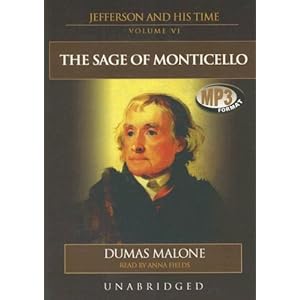 Life at Monticello was not always tranquil, but Jefferson was at his best as a family man.
Life at Monticello was not always tranquil, but Jefferson was at his best as a family man.The decisions of John Marshall plunged hm into the deepest depression of spirit that he had known since the time of the Alien and Sedition Acts.
He made too little allowance for emotions and counted too much on the sufficiency of reason.
To those who exalt force and condone deception he will ever be a visionary, to be ignored or silenced. But to all who cherish freedom and abhor tyranny in any form he is an abiding symbol of the hope that springs eternal.
What concerned him most at this time was the debt of about $11,000 that he had incurred as President.
Cultivating self-sufficiency was one way to defy the Old World and support American independence.
After war was finally declared he observed that Americans had been spared many years of it by the difficulty of selecting a foe between the two contesting powers.

When he learned from the newspapers that Napoleon had abdicated he described the fallen Emperor to John Adams as the Attila of the age, a ruthless destroyer whose thirst for human blood seemed unquenchable.
Never perhaps did this champion of human freedom state more clearly that liberty is a dubious blessing to any people unprepared for it. He doubted if the French would be ready for a "full measure of liberty' for another generation.
He was applying the principle that no generation had the right to bind another beyond its own lifetime.
The historic characters he most admired were not rulers or builders of states but Francis Bacon, Isaac Newton, and John Locke, whom he regarded as the major seers and prophets of the Enlightenment.
He quoted, often at length, from Milton, Pope, Shenstone, Gray, Collins, Swift, Young, Cunningham, Addison, and Hopkins, as well as from Homer, Theocritus, and Horace.

He himself rarely used the term "democracy," preferring "republicanism."
He did not doubt that the basic struggle would continue -- between those who trusted and those who distrusted the people generally.
Madison held that the Constitution originated in compact, that a state retained all the powers not specifically delegated to the federal government, and that it could determine when its rights had been infringed upon.
These freedmen could take care of themselves. The same could not have been said of the large body of his slaves. To have turned them loose in a society in which they would have been unwelcome would have been no kindness to them, and in view of his indebtedness may have been illegal as well as impracticable.
In theology he was a Unitarian, but he was no sectarian, and this lifelong advocate of religious freedom practiced what he preached. He drew the plans of the little Episcopal church in Charlottesville, which was consecrated a few weeks before he died. He contributed to it as he did to the Presbyterian and Baptist churches in the same community.
 |
| Martha Jefferson - Mrs. Thomas Jefferson died at the age of 33. |
No comments:
Post a Comment